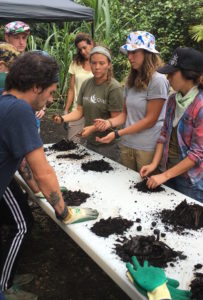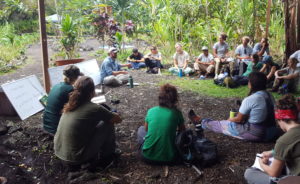By: Dara Downs, Alumni and Family Services Liaison
Pacific Quest recently offered a Horticultural Therapy training for all staff members at our Young Adult campus at Reeds Bay. This training was a unique experience where field managers came alongside field guides, and logistics staff worked side by side with nurses. Therapists and administrative staff traded their computers and phones for a trowel and some compost. In order to participate everyone left their job titles in the parking lot and put on their close toed shoes, long pants, and work gloves. They all knew, it was time to work in the garden!

Back to Basics Gardening Stations
One of the main goals of this training was to assist all employees in developing a relationship with the garden, and increase individual’s confidence on the land. In addition, the training was designed to help staff members understand the role of Horticultural Therapy (HT) and the Neurosequential Model of Therapeutics® (NMT) at PQ. In doing so, our Academic Coordinator was able to weave in parts of the HT curriculum into the training events to help set guides up with applicable lessons to use directly in the field.
The day was filled with numerous hands on activities and as every farmer knows, the best way to learn something is to get your hands dirty! The group started off with a scavenger hunt in the ethnobotanical gardens at Reeds Bay called “The Village”. These gardens focus on growing traditional Hawaiian plants which are referred to as canoe plants. Everyone used the clues in the scavenger hunt to find specific plants. Upon finding each plant, participants followed a lesson from the curriculum based off the acronym CARE (Commitment, Awareness, Relationship/Responsibility, Effort). They were able to practice caring for these sacred plants while also racing the clock!
After this competitive challenge, everyone engaged in “Back to Basics Gardening Stations” around campus. These stations focused on educating and providing hands on experiences in the following topics:
- Compost and Soil Health
- Tree Health and Bed Maintenance
- Nursery and Transplanting
- Square Foot Gardening
Presenters at each of these stations role modeled the three “R’s” of NMT: Regulate, Relate, and Reason. Each station started off with a breathing exercise, or something tactile and rhythmic, before jumping into relating to the environment, reasoning and teaching a lesson.
Following this, the group enjoyed lunch, and afterwards set up to process what they gained from the morning activities. PQ’s Horticultural Therapy Director, Travis Slagle, MA, led the group discussion on how to use these activities to engage students in meaningful conversations. He touched upon practicing these gardening techniques while developing

Travis Slagle leading group lesson
relationships with students who may be challenging or disengaged. He comments, “It is essential that we are able to successfully translate skills of intuition and observation from a gardening experience to our daily lives.” Staff members began sharing their stories and openly discussing techniques and experiences of successes they’ve had on the land. Participants shared ideas and methods that worked and helped to reach a wide variety of students.
After this open forum discussion, everyone broke into their groups again for afternoon stations which were focused on specific activities for assisting our students in the NMT model (regulate, relate and reason). The groups included, cordage making, weeding/bilateral movement, planting play, and wellness. These groups introduced themes of music and play into the garden, while also demonstrating tools like cordage making where you can bring the garden to a student. The wellness department also led a group that focused on EFT (a breathing/meditation technique), the bucket theory, and connecting plant health with gut health.
To end the day, everyone was invited to a garden party where music was played and pineapple paradise was saved from weeds and invasive species like african tulip trees. Amanda Moreno, PQ Therapist, mentioned that, “It was a gift to spend a day in the garden connecting with my peers and collaborating with my colleagues. I learned a lot about gardening and can’t wait to use it with the students.” An Adolescent Program Field Supervisor also commented, “One of my key takeaways from this training was the value of regulate, relate, and reason. I learned so many ways to engage in each of these in the field.”